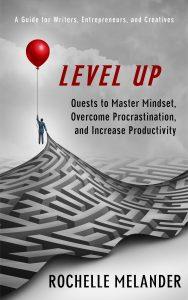Adopt a Positive Mantra
April 2, 2019
Note From Rochelle
Dear Writers,
Happy Day!
 My brand new book is available (finally!) on Amazon. Level Up: Quests to Master Mindset, Overcome Procrastination and Increase Productivity offers readers an opportunity to tackle their most common creative problems by turning them into quests. These short adventures challenge readers to investigate their life and habits to discover and use their own best practices.
My brand new book is available (finally!) on Amazon. Level Up: Quests to Master Mindset, Overcome Procrastination and Increase Productivity offers readers an opportunity to tackle their most common creative problems by turning them into quests. These short adventures challenge readers to investigate their life and habits to discover and use their own best practices.
You can order Level Up today as a Kindle ebook for just .99. (Fair warning: This is a special introductory price. The price of the book will go up in the next few days.) If you prefer a hard copy, the paperback and other ebook versions will be released on May 7, 2019.
And in honor of my new book, today’s tip features an excerpt from the book: Adopt a Positive Mantra. When life gets you down and your inner critic starts trash talking you, change it up by repeating a positive mantra.
Enjoy!
Rochelle

Adopt a Positive Mantra
by Rochelle Melander
Always remember, your focus determines your reality.
– George Lucas
Have you noticed the pop-up trend online? Many websites feature pop-up windows that invite the user to sign up for a newsletter or a coupon. Other online stores use pop-up windows that offer to “Live Chat” with site visitors. And recently when I check some of my favorite online sites from my phone, a page regularly opens and tells me, “Congratulations, you may have won an iPhone.” When I click on the back button, the page reloads. The only way out is to type the URL of the page I want in the address bar. And even then, the ad often pops up again within minutes.
This pop-up phenomenon reminds me of my brain. When I’m writing, taking care of my family, or taking a walk, negative thoughts pop up and distract me. More often than not, these thoughts aren’t helpful—they’re negative, persistent, and distracting. I’m not alone. Many of my clients and colleagues report the same phenomenon—negative messages assailing them especially when they are focused on important work.
In Tibetan Buddhism, practitioners use a mind-training tool called Lojong or slogan practice to extend compassion to themselves, others, and the world throughout the day. Lojong includes 59 slogans on a variety of themes. According to Buddhist nun Pema Chodron, Lojong practice helps us see the challenging aspects of life as opportunities to awaken our compassion. Throughout the day, the practitioner focuses on a single mantra to help them let go of disturbing thoughts and focus on more generative beliefs. Once a slogan becomes rooted in our belief system, the practitioner moves onto the next one.
In Habit Changers: 82 Game-Changing Mantras to Mindfully Realize Your Goals, author and executive coach M. J. Ryan introduces mantras that help the modern reader adapt this practice to address common negative patterns. According to Ryan, our brains conserve energy by adopting “habits of thinking and acting.” These habits drive our behavior. Ryan created each of the one-liners to help readers override the automatic thoughts and habits and act purposefully.
As writers, our negative thinking patterns often interrupt or halt our writing practice. The inner critic attacks us with negative beliefs:
- No one will buy this story.
- I’ll never finish this project.
- I don’t know enough to write this.
Lojong practice or habit changers can help us replace these negative thoughts a little bit at a time. I’ve appreciated the mantras Rose created for her book. Now when I feel worried that I haven’t accomplished enough, I repeat the mantra, “You are where you’re supposed to be.” When I compare myself to other writers, I say, “Walk your own path.” And when I have trouble knowing what to choose or how to spend my time, I say, “Trust your inner GPS.”
In this quest, you will choose one negative persistent thought and create a new mantra to replace it.
The Quest
In this quest, you’ll take a negative thought and create a one-line mantra to replace it with.
Step One: Choose a Thought
Choose the negative thought that bothers you most right now, possibly one that surfaces repeatedly.
Step Two: Create a Mantra
Create a one-line mantra that you can use to replace this thought. Here are some examples:
- Instead of No one will buy this story, try I trust that the right editor is waiting to read my story or I trust that this story will find a home.
- Instead of I’ll never finish this project, try One step at a time.
- Instead of I don’t know enough to write this, try I know just enough to write the next part.
Step Three: Repeat the Mantra
Repeat the phrase at set times throughout the day, especially when the negative thought appears. You might tie this mantra to your creative process, and repeat it before and after your writing session.
Game Play Tips
- Write your positive mantra on an index card or large piece of paper and post it where you can see it.
- Create a graphic with your mantra on it and use it on your computer, phone, or tablet.
- Choose a cue to remind yourself to repeat the mantra. Tie it to an activity, like going online, or to an external event, like the phone ringing.
- When you have mastered one mantra, choose a new one.
For the Win
This practice may seem simple—and it is. That’s why it works. It helps us retrain our brain one small step at a time.
 Write Now! Coach Rochelle Melander is a certified professional coach, experienced publishing strategist, and artist educator. She is the author of eleven books, including, Level Up: Quests to Master Mindset, Overcome Procrastination and Increase Productivity. She provides solutions for people who feel stuck, overwhelmed or confused by the publishing process. She is the founder of Dream Keepers, a writing workshop that supports teens in finding their voice and sharing their stories.
Write Now! Coach Rochelle Melander is a certified professional coach, experienced publishing strategist, and artist educator. She is the author of eleven books, including, Level Up: Quests to Master Mindset, Overcome Procrastination and Increase Productivity. She provides solutions for people who feel stuck, overwhelmed or confused by the publishing process. She is the founder of Dream Keepers, a writing workshop that supports teens in finding their voice and sharing their stories.








